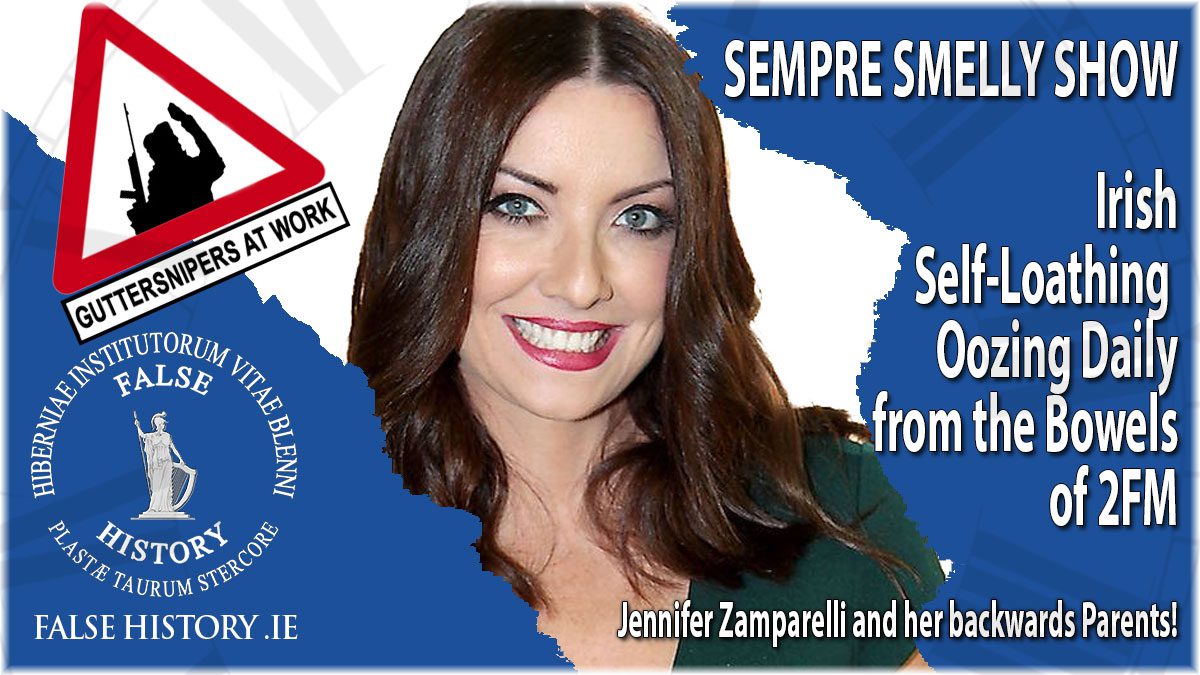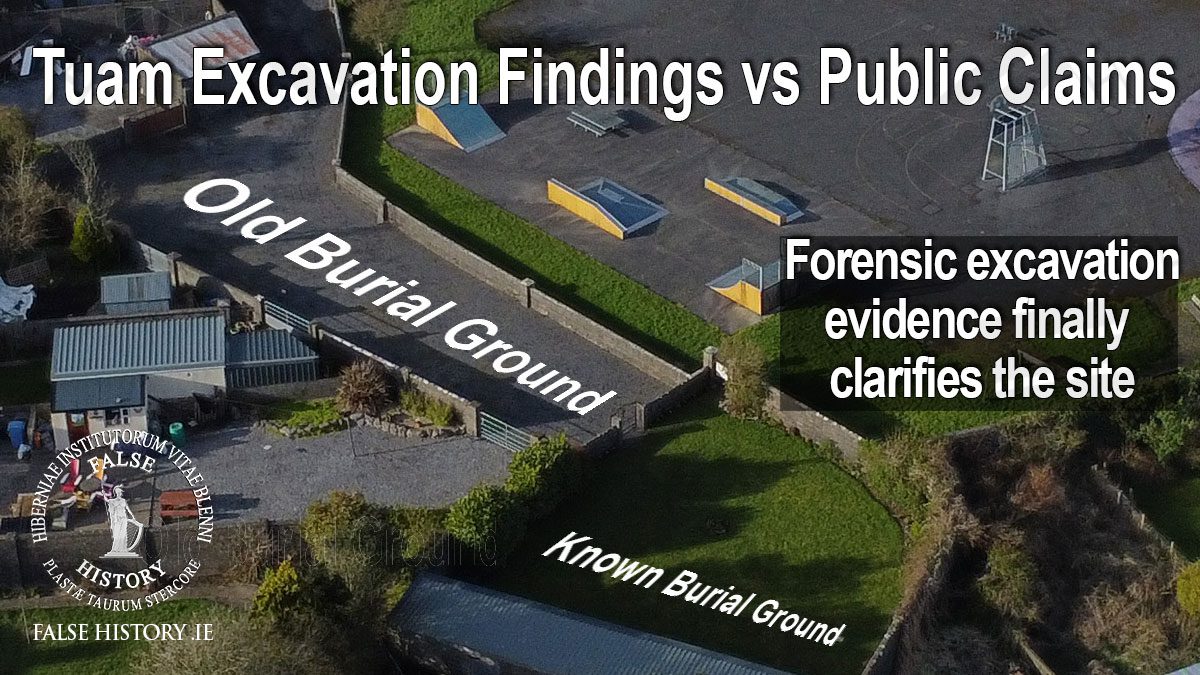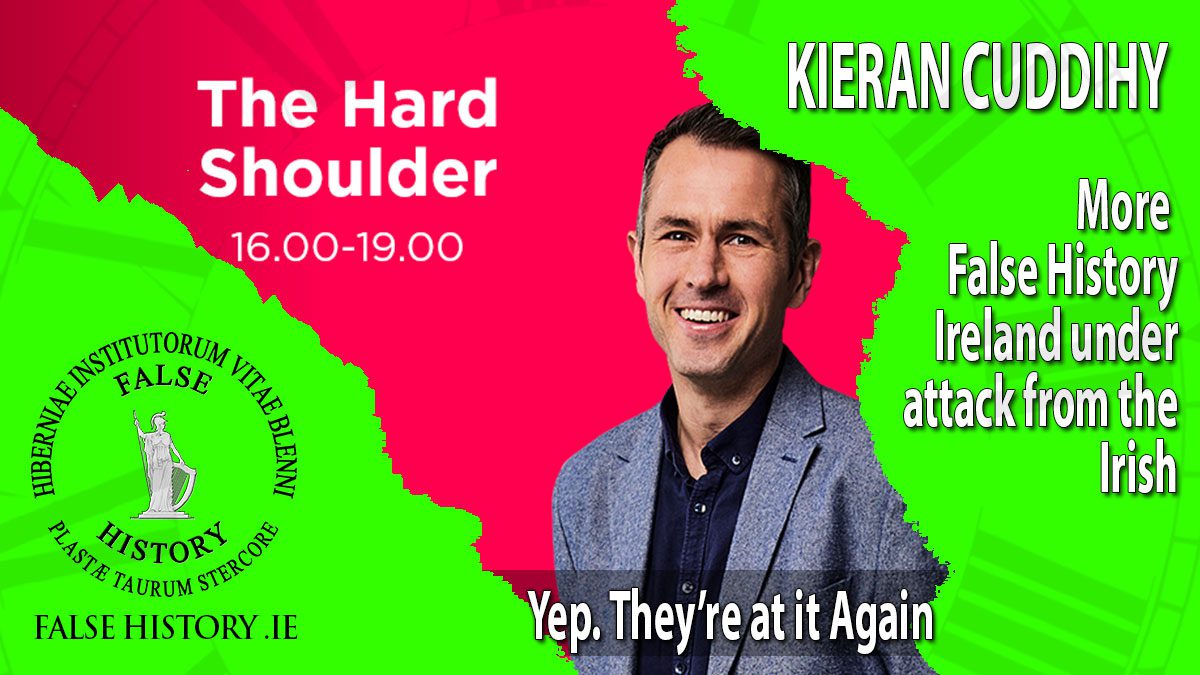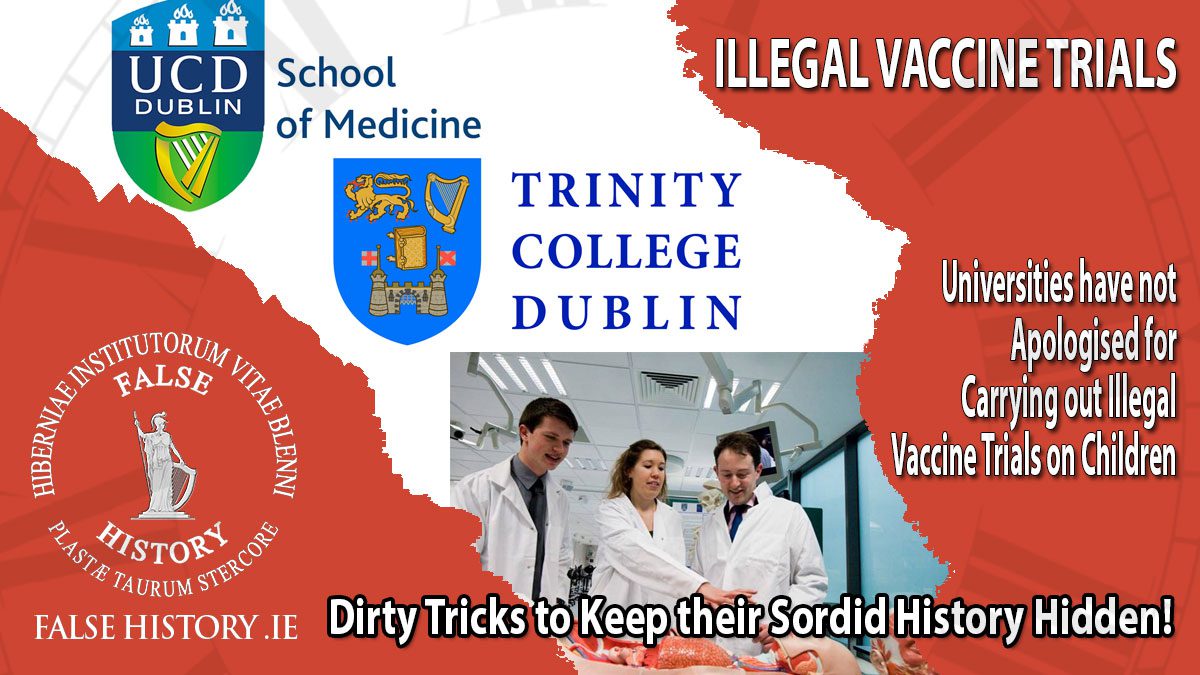Coimisiún na Meán as it has been newly named is Ireland’s media regulator. One of its functions is to handle complaints from viewers and listeners concerning content broadcast by licensed and public service broadcasters and made available on video-on-demand services. The public can take a complaint to them once their complaint has been sent to the broadcaster concerned, and after they have replied. Parts 1 & two are linked below, if you want to read them first.
My original complaint surrounded the issue that RTÉ had broadcast information without it being put through even an elementary fact checking procedure. Rather than seek the opinion of medical experts in the field of vintage medicine, their reply reveals that RTÉ’s fact checking exercise amounts to no more than the anachronistic looking up the synonyms of medical terms on websites.
I am an expert historian and it was this opinion, based on the historical evidence, that I posited in my formal complaint. It was however dismissed by RTÉ on the grounds that, “Your complaint rests primarily on your personal opinions which disagree with the opinions of those expressed in the film”.
If it is my opinion, it can be factchecked and survive such a check unlike the opinions expressed by RTÉ. As my complaint document (pdf) was titled “Stolen – Complaint about Factchecking at RTÉ”, one might have a reasonable expectation that RTÉ might have the resources and ability to conduct a competent factcheck of the issues and concerns I raised. It is evident from their reply that RTÉ conducted no such competent factcheck. Therefore, my accusation that it had not done so before broadcasting false or otherwise statements, claims, and allegations, continues to stand.
How and ever RTÉ did not provide any reason to justify why they disregarded a significant finding of an Irish government appointed commission of investigation into mother and baby homes. It is extraordinary that RTÉ can reply to a complaint without addressing such a major point. The implication is clear, RTÉ falsely considers the commission of investigation into mother and baby homes to have been incompetent and reached conclusions that were not based on fact.
These comments on the final report of the commission of investigation into mother and baby homes were completely ignored by RTÉ, without any justification. (emphasis is mine and the number is the paragraph number in the report)
- Public attention has focused on marasmus, suggesting that it indicated that many children in mother and baby homes died because of wilful (sic) neglect. The term marasmus is best seen as indicating that a child was failing to thrive, but medical experts suggest that this was due to an underlying, undiagnosed medical condition.[1]
The commission also noted in a footnote on p.36 of the Tuam Chapter
Some commentators have asserted that deaths notified as marasmus point to some level of neglect. It should be noted that 8 of 18 such deaths relating to Tuam occurred in the Central Hospital, Galway, and that 10 of the18 deaths notified as marasmus occurred among children who were accompanied by their mother at the time of death.
In their reply to my complaint, RTÉ posted quotes and links from an online English dictionary and a thesaurus, plus a feeble attempt at claiming authority using an overemphasis. An indication of the presence of ‘an appeal to authority fallacy’ with the phrase “the internationally renowned Cleveland Clinic”.
One might have expected journalists to be aware of semantic drift, that is the change in the meaning of words and terminology over time. However, marasmus was not used by medics on death certificates to suggest hunger was present and a cause of death. Contemporary medical sources list ‘marasmus’ as a wasting disease. Note the term disease. Had RTÉ researchers looked for the death certificates for people who died from hunger, perhaps even hunger strikers, they would have found that vintage medics used another medical term, ‘inanition’. The anachronistic use of a vintage medical term to imply abuse suggests a lack of expertise in dealing with historic evidence in general.
‘Hunger’ is the term mentioned in the documentary but ‘hunger’ in the same online thesaurus does not list marasmus as one of its synonyms. https://www.thesaurus.com/browse/hunger
This misinterpretation anachronistic use of the historical term ‘marasmus’ is the primary evidence that children were hungry and abuse took place in mother and baby homes.
RTÉ justified the superiority of their opinion and position:
The primary point is that the deaths of children, in the care of mother and baby institutions, were significantly higher than the national average, running, on occasion, at 5 times the national average and higher in some instances.
RTÉ chose not to consult experts in the field of vintage medicine and statistics. The infant mortality rate for Travellers in 21st century Ireland is over three and a half times that of the national average. Will RTÉ be broadcasting documentaries suggesting that Traveller infants are dying due to hunger or abuse?
‘The Infant mortality rates for Traveller children are 3.6 times that of the general population’ [2]
If RTÉ had factchecked by examining the mortality rates of other contemporary Irish and international maternity hospitals, it would have provided some valid context to the story. Many hospitals of that time recorded mortality rates higher than the national average. All hospitals have mortality rates that are above the national average. Why? Because more sick people die in hospital than elsewhere. This is known as the ‘hospital effect’ in statistics. RTÉ evidently does not know how to validly evaluate and analyse statistical information.
I stated clearly that poverty is a major factor influencing high infant mortality rates. RTÉ never bothered to look up the issue or conduct a perfunctory factcheck of this evidence. I also made it clear the dangers of drawing inferences from raw statistics, without expert guidance.
One commenter stated,
796 children and death certs and all of those horrific and appalling causes of deaths, just shocked the world. Appalling causes of death! [3]
I pointed out that tens of thousands of Irish children, born to married parents, also died from these same “horrific and appalling causes of deaths.” No attempt was made by RTÉ to factcheck this statement despite the easy availability of the evidence contained within various Registrar General’s Annual reports on the internet. The claim is intended to promote bias as it cannot stand when the true statistics are revealed. I included screenshots of a Newsweek headline plus a statistical graph from our own CSO and a headline of an Irish Times Article showing the effect that poverty has on mortality statistics. I had hoped it might whet the appetite of RTÉ researchers into investigating this important topic for the public of Ireland. However, as I suspected, this tantalising glimpse at the evidence was ignored.
In their reply RTÉ states that, the cause of child death in 18 cases is clearly listed in the Galway Register of Deaths as marasmus.[4] That figure is not in dispute but why was the protestant run Bethany home excluded when it had recorded a death toll from marasmus 44% higher than that of Tuam? The whole thrust of the programme had a discernible anti-Catholic bias and that charge can stand because significant information was left out by the producers. It is a case of lying by omission. Lying to promote sectarian prejudice.
Moreover, the figure of 18 cases represents a mere two percent of the total. If children were hated, and dispatched to the next life using hunger, any competent criminal investigator would expect this figure to have been much higher.
Tuam was a much bigger institution than Bethany. It was a refuge for women and children, not just unmarried mothers and illegitimate children. It served the poorest region of the country, yet it had a significantly lower number of deaths from ‘marasmus’ than the protestant run home. Proof perhaps of better care in the Tuam home.
It does not take much expertise to work out these figures but there is strong evidence to suggest that RTÉ nor the producers could be bothered examining the totality of the evidence.
I went to the trouble of acquiring all 796 death records that Catherine Corless had originally obtained, the same records that started the media frenzy. However, as Mrs Corless is not a historian nor has she a basic knowledge of vintage medicine, she accidently or deliberately kept key details private. Details that may have taken some of the excitement out of the frenzy. Seventy nine of those 796 deaths were of children born to married parents. However, the public has been led to believe that children were abused because they were illegitimate. RTÉ never asked questions about these children, nor does it seem that they did any research of their own. They simply relied on hearsay and repeated scurrilous allegations without any quality control measures being applied.
In their reply to my complaint RTÉ justified using a poor standard of fact checking by claiming that normal and expected quality standards do not apply because,
“Authored programmes can be seen as being somewhat similar to an opinion piece in a newspaper. They are currently most easily identified as regular insert pieces in current affairs programmes and often cover a wider variety of topics from a regular contributor. However, presenters of the authored programmes or inserts are not permitted to pursue a persistent point of view against a particular group or person which is not justified by the context or the public interest.”
Is it in the public interest to ignore factually incorrect statements made by contributors to the documentary? One contributor stated the Julia Devane[y] was “delivering and standing for babies”. A claim that is clearly wrong, Julia was employed as a gardener. I also asked RTÉ why the positive comments that Julia Devaney made about the Tuam Children’s Home had not received the same airing as some of her other comments that have been misconstrued and taken out their true context. I supplied a sample of her recorded comments. In American English the practice is called ‘contextomy’; the practice of misquoting someone by shortening the quotation or by leaving out surrounding words or sentences that would place the quotation in context. On this side of the Atlantic Ocean such behaviour is classified as a logical fallacy, called ‘quoting out of context’.
In any case, the contributor was not a “survivor” of the Tuam Children’s Home. Her speculative and mistaken comments were left to stand despite RTÉ’s claim that: The primary intention was to provide a voice for the survivors of mother and baby institutions and to allow them space to relate their personal experiences, and that is the core of the documentary: the personal stories of survivors.
The stories of some of the “survivors” are inconsistent and riddled with errors. These stories will not stand up in a court of law. I pointed this out in my complaint but RTÉ have refused to answer why these ‘tall tales’ were not factchecked.
The person who claimed that ‘marasmus’ was hunger is not a “survivor”.
Can it be taken that the non “survivors” were merely expressing opinions? The oxford dictionary defines an opinion “as a view or judgement formed about something, not necessarily based on fact or knowledge”. As many of the opinions expressed in the documentary can be proven not to be based on fact, then these can be classified as poor-quality opinions. RTÉ will have no truck with quality opinions because one, they are based on fact, and two, because of their power to destroy their sensationalist nonsense.
RTÉ quoted the broadcasting regulator, Coimisiún na Meán provides a Guidance Note in respect of “authored programmes” as per below:
However, presenters of the authored programmes or inserts are not permitted to pursue a persistent point of view against a particular group or person which is not justified by the context or the public interest.
I have demonstrated, using factual historical evidence, that RTÉ in this documentary and elsewhere, continues to pursue a persistent point of view against a particular group which is not justified by the context. I would question also is it in the public interest to present historical evidence in a biased fashion. Is it in their interest to be misled into believing a narrative based on nothing more than hearsay, appallingly bad historical interpretation and fantasy.
The Bon Secours order of nuns was named during the documentary and the comments would appear to be in contravention of rule that presenters “are not permitted to pursue a persistent point of view against a particular group.”
A commentator stated that “the Bon Secours pride themselves on the highest standards of care. So why were the children hungry?”[5]
Children were not hungry, that is a blatant lie. The commentator is not a survivor of mother and baby homes. She is a journalist with no knowledge or expertise of vintage medical terminology. A tabloid journalist with a penchant for sensationalising the mundane.
In the aftermath of the Tuam scandal, all religious sisters including the Bon Secours have been the subject of torrents of abuse and in some cases violence, because of these types of falsehoods, egged on by RTÉ and the Irish media in general.
Another contributor to the programme, Anna Corrigan, also is not a “survivor”. She quotes from a government inspector’s report dating from 1947 that lists out the diseases and conditions for various children then resident in Tuam Children’s Home. The report clearly states that her brother was well fed and had a “voracious appetite”. The inspector also stated, “the diets were excellent”.
Anna Corrigan incompetently interprets the inspector’s report and goes on to say, “so there is elements of criminality in it”. She is accusing the Bon Secours sisters of engaging in criminal activity, implying, murder. In other documentaries and newspaper publications she takes this 1947 report as evidence that children were “starved” at Tuam Children’s Home. This inference cannot be validly drawn because it is directly contradicted by the inspector’s report. Moreover, this allegation is completely fanciful.
There is nothing in the 1947 report to support the claims of abuse, nothing. Claims to the contrary rely on incompetent interpretations of both vintage and current medical terminology. John Dolan’s death was certified by a medical doctor and that is recorded on his death certificate. Ms Corrigan claims that John had a brother and that “neither of them have medical certification of death.” An allegation that is false.
John Dolan was born with a mental disability that was comorbid with, possibly, several physiological conditions including birth defects. He died from measles just like the other 105 children who died from measles in Ireland that year. The figure represents a more than 100% increase on the previous year, suggesting the presence of a measles epidemic during 1947. He was born in the Central Hospital in Galway, not in Tuam. A fact not checked by RTÉ.
While the inspector’s comments from the 1947 inspection are quoted in the documentary, its purpose was only to hold them to ridicule. “the care to the infants in the home is good. The sisters are careful and attentive. Diets are excellent.”[6]
The Irish anti-Irish prejudice known as self-loathing contained in the comment, “to me, there’s an inherent misogyny at the heart of the Irish state right from its very foundation”. For this statement to be true, it means that Irish mothers were unique amongst the women of the world, because they reared their children to hate women. Wow.
RTÉ did not directly address this comment but swatted it off because Margo Harkin stated that she loves Ireland, therefore RTÉ thinks she is entitled to make false allegations against the Irish government and by extension the nation. Ms Harkin states that “woman (sic) and children’s lives were brutally shattered”. An opinion not based on fact but fanciful nonsense, oxygenated by Irish cultural biases.
RTÉ state,
The primary intention was to provide a voice for the survivors of mother and baby institutions and to allow them space to relate their personal experiences, and that is the core of the documentary: the personal stories of survivors.
The documentary is full of interviews with people who are not “survivors” but who expressed opinions with no grounding in factual evidence that were mostly based on incompetent interpretations of historical evidence. People with no clue whatsoever of the subject matter were given free access to the national airwaves to make scurrilous allegations of abuse and neglect. The hate was not just directed at the deceased women of the Bon Secours order but at their living members also.
Everyone has the right to express their opinion but the audience has an equal right to hear opinions from alternative perspectives, otherwise it is impossible for them to evaluate such opinions for truthfulness. RTÉ and the documentary producers are aware of how dangerous alternative views are and how they can undermine their false narrative. For this reason, such views were not sought out or were deliberately excluded. RTÉ has never contacted me or any of the other authors who have questioned the false narrative peddled by RTÉ and others on this subject.
People make up fantasy stories all the time. In the UK when false allegations are found-out, the perpetrators get long jail sentences as the Carl Beech, Tanya Nasir and Liam Smith cases illustrate. In Ireland, fantasists are given compo.
RTÉ commissioning editors do not have access to the resources and expertise to evaluate and check claims, allegations etc. based on historical information. Humans, uninitiated in the study of history and historiography make incompetent judgements, which science reveals to be a cognitive bias and is termed the ‘historian’s fallacy’. Historians have a similar term, ‘presentism’, it is the false interpretation of the past due to it being viewed from a present-day perspective. The decision makers and people of the past had no access to the information we now have. The book of history is read from back to front. Any book read in this manner, clouds the judgement of the reader because they know the ending.
Science also gives us the Dunning-Kruger effect, where incompetent persons, in a specific area, lack the very expertise they need to recognise their lack of expertise. A prime example is when RTÉs Grainne McAleer confidently declared that similar words or synonyms have the same meaning. It is ignorance of synonyms but more importantly it displays an ignorance that medical terminology is esoteric. The International Classification of Diseases (ICD) has been revised eleven times since it started out as, the International List of Causes of Death, Revision 1 (ICD-1). It was released at the first International Conference for the Revision of the International List of Causes of Death in Paris on August 18, 1900. Looking up the correct ICD revision in use at that point in history is required to avoid anachronistic blunders.
The meaning of medical terms has changed so much over the years that the Systematized Nomenclature of Medicine Clinical Terms (SNOMED CT) was started in 1965 in response to semantic drift in medical clinical terminology. The proof of the Dunning-Kruger effect is that only a person with zero knowledge of vintage medicine would feel confident that their opinion is superior to that of experts in the field.
In the Irish system of justice, Judges are not allowed to evaluate their own judgements. If their judgement is questioned, it is for a higher authority to re-examine the evidence to judge if the judge, or his/her judgement was in error.
It appears that RTÉ has no system in place that can allow for fair judgement of complaints. It seems that they allowed the person, a commissioning editor, whose judgement was challenged to evaluate complaints. No person can be their own judge. Fairness and impartiality cannot exist in such a system.
Coimisiún na Meán should insist that RTÉ installs a competent fact checking unit, post haste. While at the same time, ensuring the complaints are evaluated impartially.
RTÉ quoted, Coimisiún na Meán provides a Guidance Note in respect of “authored programmes”. I cannot find this guidance note on either the CnaM website, currently undergoing transition from the BAI, and it is not on their old website either.[7] Well, at least not findable using their internal nor external search engines. I suspect it was extracted from an old RTÉ policy document, not from Coimisiún na Meán.
In conclusion, RTÉ broadcast this documentary and many more before it on the same subject where the factual basis has the appearance of dubiousness, even with a perfunctory examination. When this happens, it is because the opinions expressed align with the examiner’s own personal biases and prejudices.
RTÉ’s reply to my complaint reveals that they feel that they have the freedom to broadcast poor quality opinions, malicious or otherwise, because the quality control measures in place for current affairs does not apply to “authored programmes”. Consequently, poor quality programming is not just pervasive within the organisation, it is an organisational culture, cemented by years of arrogance. All mention of fairness and impartiality in their policy documents are rendered meaningless by the use of the “authored programmes” defence. It suggests the freedom to produce documentaries where normal fairness rules do not apply. ‘Stolen’ was presented as a factual documentary but RTÉ admit it was merely a presentation of opinions. Consequently, by RTÉ’s reckoning, factual documentaries do not need to be based on facts. It is a strange, perhaps even a perverse logic that can justify the presentation of a programme to the public, billed as a factual retelling of history, when it was not.
The “authored programmes” defence I presume was intended to protect satire, allow criticism of politicians, political system etc. and allow whistleblowers to make accusations before the facts have been established. ‘Stolen’ was not advertised as satire and so if it was meant to present the unsubstantiated opinion of whistleblowers, it would have been honest to present it as such, and not as a factual documentary. Moreover, it cannot be claimed to be a whistleblower programme as the facts were previously established by a government commission of investigation but were ignored by RTÉ.
If rules of fairness and impartiality do not apply to factual documentaries it is a loophole that RTÉ exploits to shirk its public service remit. I suggest RTÉ are use technicalities to dismiss complaints from their audience. If this is the case, then Coimisiún na Meán should act to ensure that future ‘factual documentaries’ contain opinions that are based on fact, dissuade such programme producers from lying by omission and allow alternative opinions to be heard. Only then can such programmes be beneficial to society.
There is another documentary in production that challenges the false information surrounding the Tuam Children’s Home story. Will RTÉ show it? I doubt it, because that would be proper public service broadcasting.
RTÉ state that the trust placed in them by the public is their greatest asset. Trust has been lost in RTÉ for many reasons, but it will disappear almost entirely when the truth about the mother and baby homes eventually gains public attention. It is within RTÉ’s power to stop the rot.
For the moment, the Irish people can only hope that Coimisiún na Meán has a stronger commitment to quality programming and it is not afraid to use this commitment to help rid the toxic rot from RTÉ.
Yours,
Eugene Jordan
[1] All paragraphs starting with a number are from the commission of investigation’s final report and correspond to the relevant paragraph in the report
[2] The Children’s Rights Alliance, Dublin, 25 February 2014
[3] ‘Stolen’, Stolen – There Are Dark Secrets Buried Beneath This Waterlogged Surface (Dublin, August 2024).
[4] Permit me just a tiny little nit-pick. Galway is not the Civil Registration District for Tuam
[5] ‘Stolen’.
[6] ‘Stolen’.
[7] https://www.cnam.ie https://www.bai.ie




